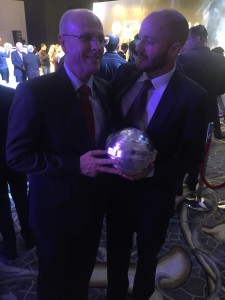I had no inkling this would turn into one of the most uplifting nights of my life as a sports journalist.
I knew that the Switzerland-based International Sports Press Association had teamed with Abu Dhabi Media to arrange for the first global competition meant to honor the best in sports journalism.
What was not clear, until tonight, was how professional, how inspirational, how self-affirming the event could be for those of us who have given our professional careers to writing about sports, speaking about sports or bringing sports to the screen.
The televised awards ceremony in the ballroom at Etihad Towers in the UAE’s capital, made sports journalists feel like what we do … matters. And might even be noble, now and then.
I wish every sports journalist on the planet could have seen this. (Check this bit of video to get a sense of what it looked and felt like.)
It was the Oscars for sports journalism, and who ever thought that would happen?
Officially, it was called the Sport Media Pearl Awards, and it featured three writing categories (column, color piece, “sport for a better world”), two in photography (athletic prowess, emotion), two in video (documentary, action sequence), one in audio and one in “journalistic weblog”.
Plus three special awards: A lifetime achievement award (“A life in sport”), best app and best investigative piece.)
And all this was backed by a judging panel that included former NBA star Yao Ming and U.S. Olympic swimmer Donna de Varona; the live television broadcast hosted by British Olympian Jonathan Edwards; and $10,000 prizes to the winner of the nine categories — plus $5,000 each to those who finished second and third.
More than 700 entries were received by the organization, from 39 countries, and some were translated into English, the language of the competition
The awards ceremony further demonstrated the breadth and depth of talent among sports journalists around the world.
The first winner, for best column, was Fiifi Anaman of Ghana, only 21 and a student, who wrote a heartfelt critique of Ghana’s national soccer team.
He broke down and wept, on stage, after being handed the globe-like Pearl trophy, saying: “A couple of months ago I had never even traveled outside Ghana and now here I am. I’m only 21 but this shows no matter who you are, where you are, you can make it.”
Hajo Seppelt of Germany’s ARD network was the star of the show, and rightfully so, for his lead role in the documentary that exposed the decades of doping among Russian track and field athletes. He won both the Pearl category “video documentary” as well as the special award for investigative reporting.
Other winners hailed from India, Cuba, Italy, the Netherlands and China, and the special awards went to an Irishman, the delightful 81-year-old sportscaster Jimmy Magee, and the French sports newspaper L’Equipe.
The final award, in the “sport for a better world” category, was meant to be the highlight of the night, much like “best picture” at the Oscar ceremonies, and it went to Paul Radley of The National. (That’s him in the photo above, on the right, with me, after the ceremony.)
The entries in this category were stories on sports initiatives by non-profit groups meant to “better the lives of the less fortunate or marginalized.”
We at The National sent Radley to Ho Chi Minh City, in Vietnam, to report on street children who were coached in taekwondo by the Christina Noble Children’s Foundation, and he produced this fine piece of work under the headline: “Street kids find safe haven in sport”.
This was the personal part of the evening. Three of us attended the awards, constituting Paul’s own entourage, and all of us have worked with him for more than six years.
We were on our feet when Paul’s name was announced, and he was short and sincere in his remarks, but his voice could be heard to quaver — because he was overwhelmed by the attention.
(I asked him later if, during the event, he wished he had never heard of Vietnam. He said he wished he’d never heard of sports writing. He was still shaking.)
The best part of winning the “sport for a better world” category was that the organizers donate $50,000 to the non-profit chosen by the winning writer, and Radley saw to it that the money goes to the Christina Noble foundation.
The Pearl Awards. It was a classy, ground-breaking and mind-expanding. I hope it is the first of many.


0 responses so far ↓
There are no comments yet...Kick things off by filling out the form below.
Leave a Comment